

Mental well-being, Physical body well-being and external environmental factors that can affect the different components of stress.
For work stress, lifestyle or placing family as priority obliges a person to work harder in a competitive environment for better pay and promotion, in order to fuel their priorities.
For personal finance, bills, housing, insurance and healthcare, can be taxing and cause worry among working adults which may cause insufficient funds for personal use.
For personal health, placing family as priority would mean working harder and skipping/ irregular meals.
1 in 2 Singapore residents feels stressed out by the thought of doing nothing: Survey, Business News. SINGAPORE - Taking a break does not seem to come easy for stressed-out Singapore residents.
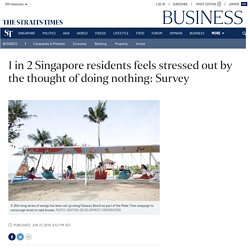
Of 600 Singaporeans and permanent residents polled in a recent survey, three in 10 said they did not know how to relax and half said they were stressed out by the thought of doing nothing. This is despite 52 per cent of those surveyed saying they felt stuck in a daily routine they were unable to get out of, and 74 per cent wishing they could spend more time with their families and loved ones. The survey, commissioned by Sentosa Development Corporation (SDC) and conducted online in April, also found that excluding mealtimes, people spent only 2.8 hours of leisure time on average with family and friends, or just slightly over 1 per cent of a week.
Experts discussing the findings on Thursday (June 27) at a media event said that making time for self and family requires deliberate adjustments. "Balance is impossible... The idea of work-life harmony has come to the fore recently. TODAYonline. SINGAPORE — Singaporeans are not only sleep deprived, but they are also among the most stressed at work globally, according to a survey by health service company Cigna released on Tuesday (Mar 26).

Nearly 92 per cent of Singaporeans surveyed were stressed from work, which was higher than the global average of 84 per cent. Of this group, 13 per cent said that the stress they faced was unmanageable. Singaporeans’ physical wellness index also dipped by 4.4 percentage points from last year, which the survey attributed to an increase in sleepless nights. Of the 23 markets surveyed, Singapore had the fifth lowest wellness index, which was measured across five key indices — family, financial, physical, social and work. Singapore fell by a place from last year as its wellness index went down by 1.7 points to 57.8. The survey collated about 13,200 responses from over 24 countries, with a sample of 502 respondents in Singapore. Read also “Vulnerability will make it seem that you are not as competent. Over 6 in 10 workers grumble about stressful job load. They even work past the official office hours.
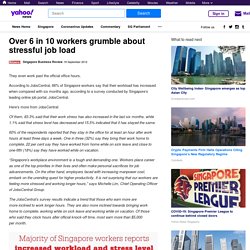
According to JobsCentral, 66% of Singapore workers say that their workload has increased when compared with six months ago, according to a survey conducted by Singapore’s leading online job portal, JobsCentral. Here's more from JobsCentral: Of them, 83.3% said that their work stress has also increased in the last six months, while 1.1% said that stress level has decreased and 15.5% indicated that it has stayed the same. 60% of the respondents reported that they stay in the office for at least an hour after work hours at least three days a week. One in three (32%) say they bring their work home to complete, 22 per cent say they have worked from home while on sick leave and close to one-fifth (18%) say they have worked while on vacation.
“Singapore’s workplace environment is a tough and demanding one. The JobsCentral’s survey results indicate a trend that those who earn more are more inclined to work longer hours. 3 big reasons Singapore employees complain about being stressed out, Business News. For as long as I can remember, Singaporeans have always been complaining about being stressed out.
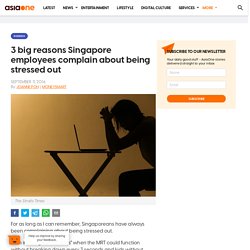
Even in the "good old days" when the MRT could function without breaking down every 3 seconds and kids without tuition still existed, Singaporeans were complaining about living in a pressure cooker society. But it seems that it's only in the last decade that workplace stress has become such a big issue. Juggling work and family time, achieving good work-life balance is possible, Lifestyle News. Good work-life balance - what does it really look like?
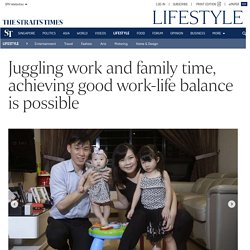
Its contours are vague, definitions different. "What constitutes a healthy work-life balance will vary substantially between individuals and families. Some people may be able to tolerate more demanding working conditions than others," says Dr Jonathan Ramsay, a lecturer at the Human Resource Management Programme at SIM University. He offers a working definition. "For most parents with office jobs - especially those with young children - a work-life balance would involve being able to spend the majority of their evenings and weekends with their children," he says.
Part of achieving work-life harmony is through communication, the sharing of thoughts and experiences and knowing that you love one another.ASSOCIATE PROFESSOR THANG LENG LENG on parents spending time with their children In the survey reported last month, one in two respondents felt their long working hours were an obstacle to their spending more time with their family. A whopping 92% of working Singaporeans are stressed – and women are prioritising families over themselves, study finds, Business Insider - Business Insider Singapore.
Pexels If you’re feeling stressed at work, you’re not alone.
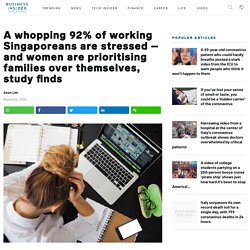
3 KEY STRESS FACTORS. Workshops to give women a helping hand on managing family health and work-life balance, Singapore News. SINGAPORE - A new series of workshops fronted by the People's Association - and organised by women for women - will begin in May.
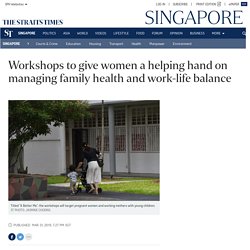
Titled "A Better Me", the workshops will target pregnant women and working mothers with young children. The topics to be covered include women's and family's health and work-life balance. Senior Minister of State for the Environment and Water Resources and Health Amy Khor announced this on Sunday (March 31) at this year's International Women's Day conference.
"Many women continue to grapple with whether they should devote more time to care for their family instead, and juggle their many roles as wife, mother, daughter, employee or employer, and caregiver," Dr Khor said. "But the irony is that often these women juggling multiple roles have little to no time to take charge of their own health," she added,
How to Use Positive Self Talk for Stress Relief. You may not realize it, but your self-talk may be sabotaging your stress levels!

Self-talk—the way your inner voice makes sense of the world around you and the way you communicate with your inner self—can greatly affect your stress levels in multiple ways.1 If your self-talk is generally negative, you may be perceiving events if your life as more stressful than they need to be and creating unnecessary anxiety and stress for yourself.2 You may be attributing negative motivations to people who are well-meaning, you may be perceiving yourself as less equipped to handle challenges you face, and you may be seeing only more negatives than positives in what you are facing in life, when there may be a much less stressful "bright side" you're not perceiving because of habitual negative self-talk.
You may also succumb to rumination, a pattern of negative thinking that can consume your idle time and bring stress from the past into the present unnecessarily without leading to any resolution.3. High-performance Teams: Understanding Team Cohesiveness. “There is a desire in each of us to invest in things that matter, and to have the organizations in which we work be successful…Our task is to create organizations we believe in…to be part of creating something we care about so we can endure the sacrifice, risk, and adventure that commitment entails.
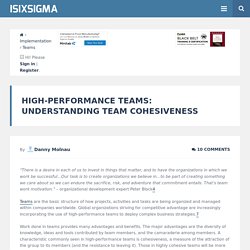
That’s team work motivation.” – organizational development expert Peter Block4 Teams are the basic structure of how projects, activities and tasks are being organized and managed within companies worldwide. Global organizations striving for competitive advantage are increasingly incorporating the use of high-performance teams to deploy complex business strategies.7 Work done in teams provides many advantages and benefits.
10 Best Foods to Fight Off Stress. Sometimes it's the feeling that food or drinks induce, not their nutrients, that helps reduce stress.

Drinking a warm cup of tea is one way to help make yourself feel calmer, says Sandra Meyerowitz, MPH, RD, an online nutrition coach and owner of Nutrition Works in Louisville, Kentucky. Past research has suggested that holding and sipping a warm beverage increases feelings of interpersonal “warmth” and friendliness. There's a soothing effect of sipping a warm drink, regardless of the flavor — but certain herbs, like lavender and chamomile, have been shown to have a relaxing effect on their own, Meyerowitz says.
Figueroa agrees herbal tea is great for winding down but says green tea is perfectly fine when you need a small jolt of caffeine because it’s full of flavonoids, which studies show support brain health. According to the Mayo Clinic, a cup of brewed green tea contains between 25 and 29 milligrams (mg) of caffeine versus black brewed coffee’s 95 to 165 mg per cup. Exercising to relax. How does exercise reduce stress, and can exercise really be relaxing? Rest and relaxation. It's such a common expression that it has become a cliche. And although rest really can be relaxing, the pat phrase causes many men to overlook the fact that exercise can also be relaxing.
It's true for most forms of physical activity as well as for specific relaxation exercises. Exercise is a form of physical stress. How exercise reduces stress Aerobic exercise is key for your head, just as it is for your heart.